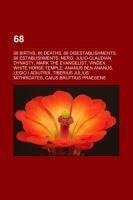
68
Source: Wikipedia. Pages: 27. Chapters: 68 births, 68 deaths, 68 disestablishments, 68 establishments, Nero, Julio-Claudian dynasty, Mark the Evangelist, Vindex, White Horse Temple, Ananus ben Ananus, Legio I Adiutrix, Tiberius Julius Mithridates, Caius... Viac o knihe
Produkt je dočasne nedostupný
13.64 €
bežná cena: 15.50 €
O knihe
Source: Wikipedia. Pages: 27. Chapters: 68 births, 68 deaths, 68 disestablishments, 68 establishments, Nero, Julio-Claudian dynasty, Mark the Evangelist, Vindex, White Horse Temple, Ananus ben Ananus, Legio I Adiutrix, Tiberius Julius Mithridates, Caius Bruttius Praesens, List of state leaders in 68, Nymphidius Sabinus, Salonina Matidia, Publius Petronius Turpilianus, Lucius Clodius Macer, Basilissa and Anastasia, Felix and Costanza, Legio I Macriana liberatrix, Polyclitus. Excerpt: Nero (Latin: ; 15 December 37 - 9 June 68), was Roman Emperor from 54 to 68. He was the last emperor of the Julio-Claudian dynasty. Nero was adopted by his great-uncle Claudius to become his heir and successor. He succeeded to the throne in 54 following Claudius' death. During his reign, Nero focused much of his attention on diplomacy, trade, and increasing the cultural capital of the empire. He ordered the building of theaters and promoted athletic games. During his reign the redoubtable general Corbulo conducted a successful war and negotiated peace with the Parthian Empire. His general Suetonius Paulinus crushed a revolt in Britain. Also, he annexed the Bosporan Kingdom to the empire, and the First Roman-Jewish War commenced. In 64, most of Rome was destroyed in the Great Fire of Rome. In 68, the rebellion of Vindex in Gaul and later the acclamation of Galba in Hispania drove Nero from the throne. Facing assassination, he committed suicide on 9 June 68. Nero's rule is often associated with tyranny and extravagance. He is known for a number of executions, including those of his mother and the probable murder by poison of his stepbrother, Britannicus. He is also infamously known as the emperor who "fiddled while Rome burned", and as an early persecutor of Christians. He was known for having captured Christians burned in his garden at night for a source of light. This view is based upon the writings of Tacitus, Suetonius, and Cassius Dio, the main surviving sources for Nero's reign. Few surviving sources paint Nero in a favorable light. Some sources, though, including some mentioned above, portray him as an emperor who was popular with the common Roman people, especially in the East. The study of Nero is problematic as some modern historians question the reliability of ancient sources when reporting on Nero's tyrannical acts. Lucius Domitius Ahenobarbus, the future Nero, was born on 15 December AD 37 in Antium, near Rome. He was the only son of Gnaeus Domitius Aheno
- Vydavateľstvo: Books LLC, Reference Series
- Formát: Paperback
- Jazyk:
- ISBN: 9781156003596


 Anglický jazyk
Anglický jazyk 



 Ruský jazyk
Ruský jazyk 





